
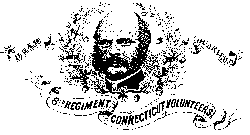

Eighth Regiment Connecticut Volunteers
Company A, Inc.
Morgan's Raid III - "The Pursuit"
Sept. 15-18, 2016
Meigs County, Ohio

In camp near Portland, Ohio
July 19, 1863
Dear Friends,
This whole campaign started on a Wednesday afternoon. We were ordered to rendezvous in Wallingford, at Camp Conable. There we arranged our baggage, loaded the wagons, and started off with a holler for the west. We traveled on some good long time into the sunset, and beyond that first night. We stopped in Hagerstown, Md., at an inn for respite and rest. The morning came early and we passed through the city, and determined to make a diversion through Sharpsburg. There, we checked up on the proceedings to shore up the Burnside bridge. It was coming along famously to the tune of $1.8 millions. The workers were very jovial, and who would not be at those rates. From there we proceeded to Harpers Ferry road, and to the monument of the Eighth Connecticut Volunteers. A few prayers were said, a few images taken, and we were once again on our way to the west.
We traveled through western Maryland, and into West Virginia. The landscape became more and more rural, and then more winding, and hilly, then mountainous. Beautiful places abounded, yet no real livings except farming were to be seen. We started after hours to descend, and then out into the Ohio valley piedmont, and after a time, we crossed the mighty Ohio River into Ohio itself. From there we turned ever west, skirting the northern bank of the river until the signs told us we have arrived in Portland, Ohio.
The town itself, we learned later, had been a thriving place on the river, landings, factories, and all. In some of the past two major floods, the town was basically swept away, and there were no takers to rebuild, except for the farming community that is still there. Their community, though, is strong, and their hospitality would be proven to be the best ever received.
We were ordered to these parts to help combat, intercept, and capture the infamous General John Hunt Morgan, who audaciously invaded the North around the 4th of July 1863, and wreaked havoc and mayhem across Indiana, heading east, and into Ohio. They took every horse they could find, and stole everything else. They looted and burned warehouses, barns, factories, and mills. They were an evil that needed stopping. Their numbers were sighted nearby at about 100 horsemen, riding hard for the river. It is thought that they are heading east to force a crossing at Buffington's Island near here. We are here to prevent that and capture the whole lot.
When we arrived and presented our orders, we were told to go into camp here in the park, being an ancient Indian burial site, with a large mound built in the center of it. The park is squeeze in between two large fields of good standing corn. Across the highway is a short flat to the river itself. We set our common tents and shelters under a spreading tree for shade and protection from any rain, and proceeded to make ourselves comfortable with a good camp fire by the Pyro and his Apprentice. We cooked our beef rations on the spot, and saved some of the bacon for the morrow.
At first light, Friday morning, reveille was called, and we were directed to the community hall for a breakfast put on by the town’s people. They served up the first of many breakfasts of biscuits and gravy, one of the local staples. It sure is a good meal that sticks to the ribs and any other thing that it comes in contact with. The folks left no stone unturned on their show of hospitality. They had hot coffee, plates, forks, cups, and all sorts of trimming like toast, sticky buns, corn bread, oatmeal, and everything else. The dining tables were covered, and each one had a fly swatter provided for the probable entomological visits.
 Once back in camp, the roll was taken, inspections given, and we were boarded on the wagons and set off for Chester, Ohio. It was a rather hard road, when we turned into what was the county fair grounds. We pulled up in the vicinity of a large grand stand on an arena. To our front was a road winding up and over the ridge, and to our back was a cliff or bluff rising quickly to a height of about 50 or 75 feet. This was the place where we would ambush Morgan's men as they passed. It was called "The Gauntlet". Morgan’s men did appear ambling along the road towards Chester, and they passed in front of us, and the entire public school student body in the grand stands, where we surprised them, harassed them, and sent them on their way with a few less seats in saddles.
Once back in camp, the roll was taken, inspections given, and we were boarded on the wagons and set off for Chester, Ohio. It was a rather hard road, when we turned into what was the county fair grounds. We pulled up in the vicinity of a large grand stand on an arena. To our front was a road winding up and over the ridge, and to our back was a cliff or bluff rising quickly to a height of about 50 or 75 feet. This was the place where we would ambush Morgan's men as they passed. It was called "The Gauntlet". Morgan’s men did appear ambling along the road towards Chester, and they passed in front of us, and the entire public school student body in the grand stands, where we surprised them, harassed them, and sent them on their way with a few less seats in saddles.
We then took the wagons again, further into the hinterlands, and were dumped off in the back lots of a beef farm near a lazy wandering rather dry creek. We rested briefly at that location, and drank as much water as we could muster in the heat and humidity.
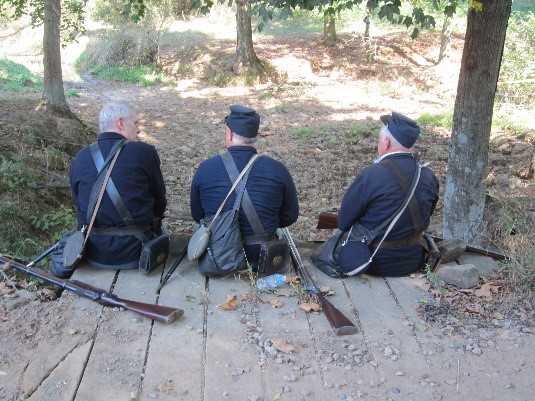 Our artillery were deployed once on the scene, and the infantry, divided into two companies, one of muskets, and one of Henry repeating rifles. As we marched cross lots along an old wood road, some called the Pomeroy Turnpike, we later learned that it lead out to the center of the Chester village. Along the ways, we were looking for another good place to set and wait to ambush the cavalry known to be coming our way. We did set a trap at the end of a field as it closed down and went into an uphill wood road. The Henrys were deployed at a closed gate into this field, and we were deployed in the wood line at the other end. It did not take long, and we heard an artillery fire canister. Then we heard a second, and then a third. The gunners had surprised the raiders and got off three good rounds into them. So, we knew it would be about ten minutes and they would be upon us. And that they were. They did not track on the cow paths that lead us to our places. Half of them, they took the Pomeroy pike on the higher ground, and easily flanked us, and the other half rode into our muskets rode over us with abandon. This indeed is the very first time that I have fought on foot against cavalry, and it is a lesson you will rarely get to repeat. They are so fast and so strong, you cannot stand and fight them, it is folly. They must be surprised and caught off guard.
Our artillery were deployed once on the scene, and the infantry, divided into two companies, one of muskets, and one of Henry repeating rifles. As we marched cross lots along an old wood road, some called the Pomeroy Turnpike, we later learned that it lead out to the center of the Chester village. Along the ways, we were looking for another good place to set and wait to ambush the cavalry known to be coming our way. We did set a trap at the end of a field as it closed down and went into an uphill wood road. The Henrys were deployed at a closed gate into this field, and we were deployed in the wood line at the other end. It did not take long, and we heard an artillery fire canister. Then we heard a second, and then a third. The gunners had surprised the raiders and got off three good rounds into them. So, we knew it would be about ten minutes and they would be upon us. And that they were. They did not track on the cow paths that lead us to our places. Half of them, they took the Pomeroy pike on the higher ground, and easily flanked us, and the other half rode into our muskets rode over us with abandon. This indeed is the very first time that I have fought on foot against cavalry, and it is a lesson you will rarely get to repeat. They are so fast and so strong, you cannot stand and fight them, it is folly. They must be surprised and caught off guard.
After Morgan’s men whipped us, we proceeded to march up hill to a crest, where we rested and licked our wounds. Dave of our band was nursing his brogan, as it had gone sole flopping and had to constantly be tied to try to walk. We marched downhill for some mile or so, and came to a well placed farm house, surrounded by trees for shade for the soldiers and a pond of good water for the horses. And we were greeted by the most hospitable residents there that could not do enough for us and our comfort. They were fetching water to all, and making every comfort available.
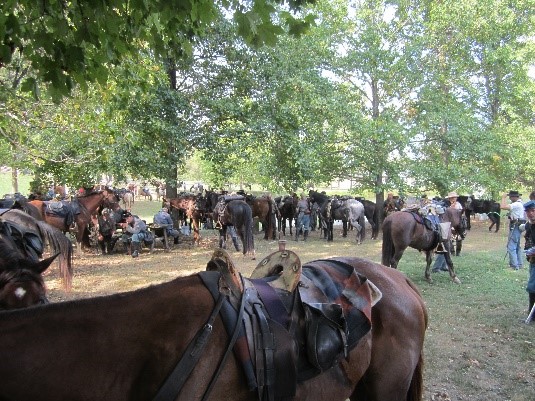 When it came time to move, the owner declared that we would take us quicker to the center of Chester to defend the town on his team and hay wagon than if we were to march into town. The officers agreed to it, and so we all piled on the wagon, and he whipped up the team. The wagon bumped a few times, determined to have two broken wheels. He attended briefly to them and the soldiers thought it was back to the foot work. But the farmer said he did not care a bit, all pile on, we were going on the wagon, bad wheels or not. And so we did, barely making it to the Chester center. Our own Daryll took the worst of it, sitting right over the bad front wheel, and getting a good bone jarring all the way. His teeth are still chattering. But it was better than walking.
When it came time to move, the owner declared that we would take us quicker to the center of Chester to defend the town on his team and hay wagon than if we were to march into town. The officers agreed to it, and so we all piled on the wagon, and he whipped up the team. The wagon bumped a few times, determined to have two broken wheels. He attended briefly to them and the soldiers thought it was back to the foot work. But the farmer said he did not care a bit, all pile on, we were going on the wagon, bad wheels or not. And so we did, barely making it to the Chester center. Our own Daryll took the worst of it, sitting right over the bad front wheel, and getting a good bone jarring all the way. His teeth are still chattering. But it was better than walking.
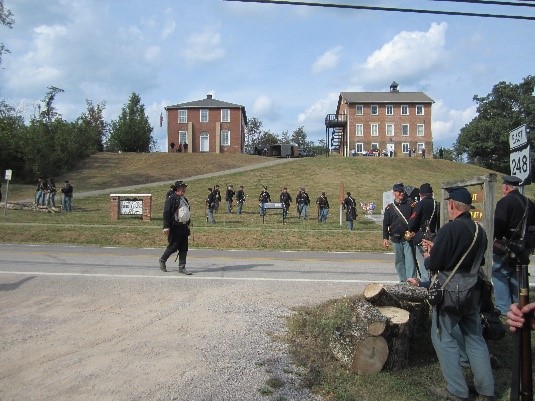 In Chester, the word was to get behind the breastworks erected by the advance guard, the militia, and the town sheriffs. And we did. There was a Court House and a Jail high on a hill hard by the town green. That was the center of the attack. The sheriffs on horse signaled Morgan's approach, and so we laid it into them best we could. We fancied ourselves holding Summerfield's establishment, but we were overrun in the front, flanked on the left, and they ran up the court house hill to the left of the green and took all in control. They made the towns folk tell where the way was to the ford, and then off they went.
In Chester, the word was to get behind the breastworks erected by the advance guard, the militia, and the town sheriffs. And we did. There was a Court House and a Jail high on a hill hard by the town green. That was the center of the attack. The sheriffs on horse signaled Morgan's approach, and so we laid it into them best we could. We fancied ourselves holding Summerfield's establishment, but we were overrun in the front, flanked on the left, and they ran up the court house hill to the left of the green and took all in control. They made the towns folk tell where the way was to the ford, and then off they went.
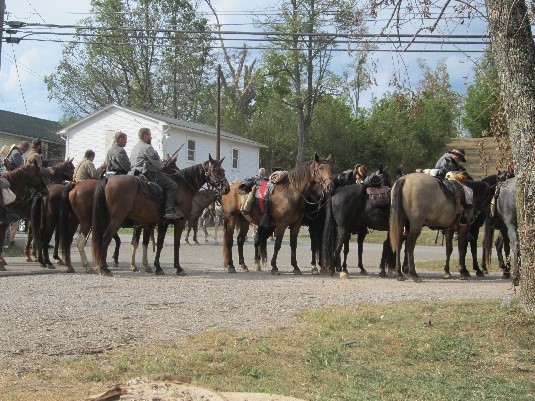 We adjourned to Summerfield's, got a couple good cold bitters from the General, and then cooled down back on the green. We were invited to the fire house of the village, and they laid out a wonder filled fish fry with corn bread and sweet tea that simply could not be beat. We adjourned to the town green once more where we waited for conveyance back to our camps for the night.
We adjourned to Summerfield's, got a couple good cold bitters from the General, and then cooled down back on the green. We were invited to the fire house of the village, and they laid out a wonder filled fish fry with corn bread and sweet tea that simply could not be beat. We adjourned to the town green once more where we waited for conveyance back to our camps for the night.
 The word came that there was a driver, Mary, who would do anything. So she came and determined to take us back to Portland. And so we clambered into her wagon, and went off with a snap. This was the most death defying ride through the country side we ever had. We were lurching and bouncing at high speeds around and over hill and dale. She was a spirited local and told many a colorful tale along the way, but we bid her to keep her eye on the road. At one point when the road looked familiar again, Chuck asked her if she knew where we might get some straw for our beds. She, said, yes, right here yonder I know a man, as he cuts my fields. With that she turned on a dime into a barnyard, jumped off the wagon and went and rounded up the man. Chuck asked how much for straw, and the fellow said "As much as I can get." Chuck offered a fair price, and the fellow said he would only take half that since we being there were doing good for his town. So we threw the straw into Mary's wagon, got to camp, and bid her thanks and good bye. We spent the night nursing our wounds, fixing brogans, and spreading straw in the tents.
The word came that there was a driver, Mary, who would do anything. So she came and determined to take us back to Portland. And so we clambered into her wagon, and went off with a snap. This was the most death defying ride through the country side we ever had. We were lurching and bouncing at high speeds around and over hill and dale. She was a spirited local and told many a colorful tale along the way, but we bid her to keep her eye on the road. At one point when the road looked familiar again, Chuck asked her if she knew where we might get some straw for our beds. She, said, yes, right here yonder I know a man, as he cuts my fields. With that she turned on a dime into a barnyard, jumped off the wagon and went and rounded up the man. Chuck asked how much for straw, and the fellow said "As much as I can get." Chuck offered a fair price, and the fellow said he would only take half that since we being there were doing good for his town. So we threw the straw into Mary's wagon, got to camp, and bid her thanks and good bye. We spent the night nursing our wounds, fixing brogans, and spreading straw in the tents.
Saturday morning brought reveille and the ubiquitous biscuits and gravy as told above. The kindness and hospitality of the town’s people has never before or since been matched. We were told to be ready to move at 9 of the clock. That hour came and went, and more waiting was had by all. We were to proceed to the river landing close by, but it was determined that we had lost contact with the three stern wheelers. They had been lost in the night. Riders and sentries were sent for miles up and down the river to see if they might be spotted. In the meantime, it seemed that we would be stuck in camp, and that the rebel Morgan might just slip across back to Virginia. Spirits were low indeed. Then just around the meridian, word came that we had found the boats. And all preparations were put back in action.
 We boarded the wagons, and were fetched to the landing and lo, there were three of the most formidable stern wheel federal gun boats ever. They were named the USS Moose, Victory, and Reindeer. We were assigned and boarded the Victory, and our artillery placed a gun on each of the bows of the boats. We backed out into the current, and headed down stream. This indeed was the first time I was ever ordered to fight from a boat in the army, but it was good fun to travel in this way. Until the raiders started taking pot shots at us exposed on deck from the shelter of the trees and brush on the Ohio banks. We returned our fire with gusto and good effect. They ran off the banks and back inland. They had a howitzer open upon us, and so that started the parade. Each paddle boat in turn would take a run as close to the shore they could run, and we gave them our guns and a good broadside of rifles. And so the next boat, and the next, Then the pilots spin out into the channel, head upstream in single file, and come around again for another run past the rebels. Good fun until someone gets hurt. And so it was our Lt. who got blasted right out of his chair on desk with a shot through the clothes. He was embarrassed but unhurt.
We boarded the wagons, and were fetched to the landing and lo, there were three of the most formidable stern wheel federal gun boats ever. They were named the USS Moose, Victory, and Reindeer. We were assigned and boarded the Victory, and our artillery placed a gun on each of the bows of the boats. We backed out into the current, and headed down stream. This indeed was the first time I was ever ordered to fight from a boat in the army, but it was good fun to travel in this way. Until the raiders started taking pot shots at us exposed on deck from the shelter of the trees and brush on the Ohio banks. We returned our fire with gusto and good effect. They ran off the banks and back inland. They had a howitzer open upon us, and so that started the parade. Each paddle boat in turn would take a run as close to the shore they could run, and we gave them our guns and a good broadside of rifles. And so the next boat, and the next, Then the pilots spin out into the channel, head upstream in single file, and come around again for another run past the rebels. Good fun until someone gets hurt. And so it was our Lt. who got blasted right out of his chair on desk with a shot through the clothes. He was embarrassed but unhurt.
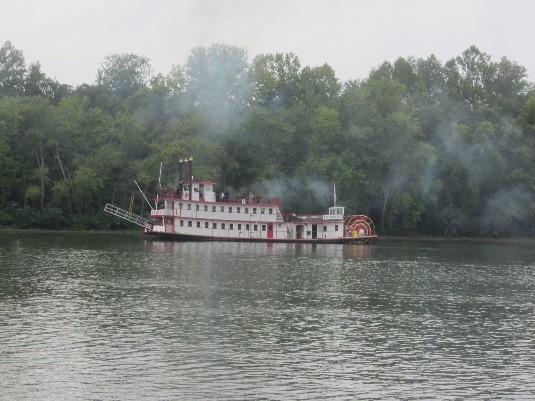 We gathered the boats tightly in the stream, then all headed for Portland landing at once, hit the banks, gang plank slammed down, and the army streaming onto the shore.
We gathered the boats tightly in the stream, then all headed for Portland landing at once, hit the banks, gang plank slammed down, and the army streaming onto the shore.
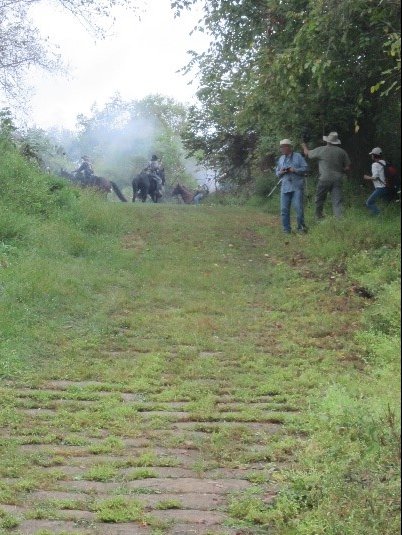 The landing was cobblestone, and the rebel cavalry was right there to contest us, but the push and the firepower we laid down, they could not get enough front on us to match. They retired slowly as we made it off the landing and onto the road in column of companies. We pushed the raiders to the east along the road parallel to the banks. Some of our troops got around our left flank to get to their guns and captured the lot of them. Half of Morgan’s men, including his brother, were forced to surrender right there. We marched further to try to engage the rest of the rebels but they rode hard and fast, and eluded the infantry once more.
The landing was cobblestone, and the rebel cavalry was right there to contest us, but the push and the firepower we laid down, they could not get enough front on us to match. They retired slowly as we made it off the landing and onto the road in column of companies. We pushed the raiders to the east along the road parallel to the banks. Some of our troops got around our left flank to get to their guns and captured the lot of them. Half of Morgan’s men, including his brother, were forced to surrender right there. We marched further to try to engage the rest of the rebels but they rode hard and fast, and eluded the infantry once more.
We returned to camp, got another meal from the towns folk of fried chicken, corn, potato, corn bread, and apple pies. Such a special reward for ridding the area of half the raiders. We talked with a talkative fellow named Lyle around the fire that night and learned many a tale about the local area, Portland, Meigs County, and the history of its roots, its revolutionary founders, where to get good shine, and how they make rope. We went to bed that night tired, happy, and dry. In the night the rains started, but never were too hard.
Sunday morning was again much the same drill, town’s people make biscuits and gravy, solders eat it, we take wagons to a lower landing, and get on our assigned steam boats. I am just now getting a little fond of biscuits and gravy.
 The boats pulled back into the current, and they navigated down the inside of Buffington's Island, patrolling the banks for the remainder of the raider rebels. We saw none, so the flotilla pulled out into the main river, and headed up stream and steamed in that direction for several miles. At one point, the Reindeer comes along side with orders, and the Moose slows and stops. The captains navigated the boats into a squadron for attack once more. The rebels were spotted on the banks in numbers, on horse, on foot, and artillery. There was a sign spotted, "Welcome Yankee Scum, Your Friends, Borroughs Battery". That was enough to draw the attack of the boats in echelon and by broadside once more. The fight was ferocious. At one point, we were making our run on the Victory, and the rebel cannon went off point blank. The smoke ring thus formed came on hard and fast, and just grazed the front of pilot house. Everyone took a sigh of relief, and renewed our firing on their positions.
The boats pulled back into the current, and they navigated down the inside of Buffington's Island, patrolling the banks for the remainder of the raider rebels. We saw none, so the flotilla pulled out into the main river, and headed up stream and steamed in that direction for several miles. At one point, the Reindeer comes along side with orders, and the Moose slows and stops. The captains navigated the boats into a squadron for attack once more. The rebels were spotted on the banks in numbers, on horse, on foot, and artillery. There was a sign spotted, "Welcome Yankee Scum, Your Friends, Borroughs Battery". That was enough to draw the attack of the boats in echelon and by broadside once more. The fight was ferocious. At one point, we were making our run on the Victory, and the rebel cannon went off point blank. The smoke ring thus formed came on hard and fast, and just grazed the front of pilot house. Everyone took a sigh of relief, and renewed our firing on their positions.
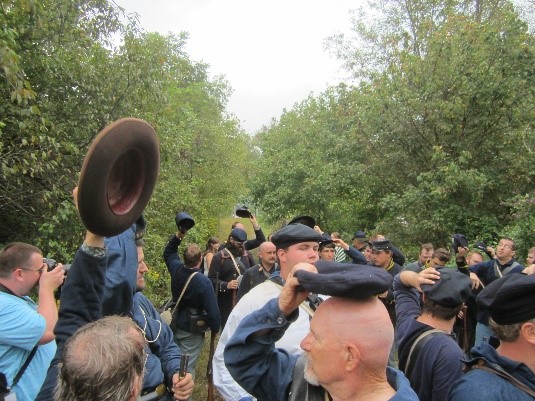 We came on the Portland landing once more, marched up the ramps uncontested to find that the Union cavalry was already there and had chased the rebel cavalry from contesting our landing. Good use of cavalry I would venture for once. We marched behind the cavalry all along the Portland road, where north of the town, a cavalry battle erupted. Charge upon charge, and supported by the infantry, the Union prevailed this time over the depleted Morgan's Raiders. Yet another large portion of them were captured and paraded in front of our command and the local citizens. It is said that Morgan himself had eluded us once more, and had escaped further to the east with a small band of rebels. I am sure that they will not cross the river to safety, but will be captured in the days to come.
We came on the Portland landing once more, marched up the ramps uncontested to find that the Union cavalry was already there and had chased the rebel cavalry from contesting our landing. Good use of cavalry I would venture for once. We marched behind the cavalry all along the Portland road, where north of the town, a cavalry battle erupted. Charge upon charge, and supported by the infantry, the Union prevailed this time over the depleted Morgan's Raiders. Yet another large portion of them were captured and paraded in front of our command and the local citizens. It is said that Morgan himself had eluded us once more, and had escaped further to the east with a small band of rebels. I am sure that they will not cross the river to safety, but will be captured in the days to come.
We returned to camp, sounded the general, struck the tents, packed the baggage, and loaded the wagons for the trip back home, We started off and traveled for hours to Chambersburg, spent the night, arose and resumed the trek the next day. No, we did not have biscuits and gravy for breakfast.
But such is the adventure that put us on stern wheeler river boats for a truly once in a lifetime adventure. And, yes, we did finally capture that raider rebel. But he escaped to be killed trying to escape capture a year later. Such is the fate of a guerrilla.
Your humble servants,
Don, Chuck, Dave, Daryll, Kim
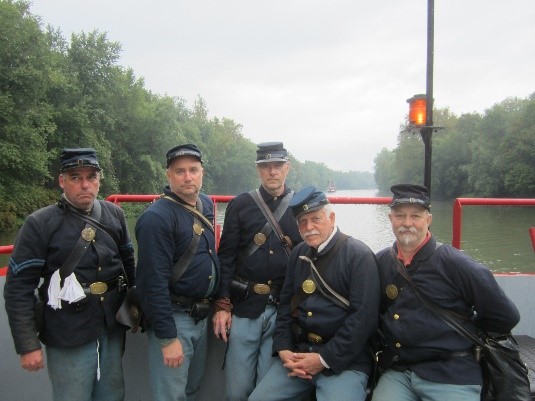


 E-Mail Us for More Information!
E-Mail Us for More Information!
Eighth Regiment Connecticut Volunteers, Co.A, Inc.
8cv@comcast.net






 Once back in camp, the roll was taken, inspections given, and we were boarded on the wagons and set off for Chester, Ohio. It was a rather hard road, when we turned into what was the county fair grounds. We pulled up in the vicinity of a large grand stand on an arena. To our front was a road winding up and over the ridge, and to our back was a cliff or bluff rising quickly to a height of about 50 or 75 feet. This was the place where we would ambush Morgan's men as they passed. It was called "The Gauntlet". Morgan’s men did appear ambling along the road towards Chester, and they passed in front of us, and the entire public school student body in the grand stands, where we surprised them, harassed them, and sent them on their way with a few less seats in saddles.
Once back in camp, the roll was taken, inspections given, and we were boarded on the wagons and set off for Chester, Ohio. It was a rather hard road, when we turned into what was the county fair grounds. We pulled up in the vicinity of a large grand stand on an arena. To our front was a road winding up and over the ridge, and to our back was a cliff or bluff rising quickly to a height of about 50 or 75 feet. This was the place where we would ambush Morgan's men as they passed. It was called "The Gauntlet". Morgan’s men did appear ambling along the road towards Chester, and they passed in front of us, and the entire public school student body in the grand stands, where we surprised them, harassed them, and sent them on their way with a few less seats in saddles. Our artillery were deployed once on the scene, and the infantry, divided into two companies, one of muskets, and one of Henry repeating rifles. As we marched cross lots along an old wood road, some called the Pomeroy Turnpike, we later learned that it lead out to the center of the Chester village. Along the ways, we were looking for another good place to set and wait to ambush the cavalry known to be coming our way. We did set a trap at the end of a field as it closed down and went into an uphill wood road. The Henrys were deployed at a closed gate into this field, and we were deployed in the wood line at the other end. It did not take long, and we heard an artillery fire canister. Then we heard a second, and then a third. The gunners had surprised the raiders and got off three good rounds into them. So, we knew it would be about ten minutes and they would be upon us. And that they were. They did not track on the cow paths that lead us to our places. Half of them, they took the Pomeroy pike on the higher ground, and easily flanked us, and the other half rode into our muskets rode over us with abandon. This indeed is the very first time that I have fought on foot against cavalry, and it is a lesson you will rarely get to repeat. They are so fast and so strong, you cannot stand and fight them, it is folly. They must be surprised and caught off guard.
Our artillery were deployed once on the scene, and the infantry, divided into two companies, one of muskets, and one of Henry repeating rifles. As we marched cross lots along an old wood road, some called the Pomeroy Turnpike, we later learned that it lead out to the center of the Chester village. Along the ways, we were looking for another good place to set and wait to ambush the cavalry known to be coming our way. We did set a trap at the end of a field as it closed down and went into an uphill wood road. The Henrys were deployed at a closed gate into this field, and we were deployed in the wood line at the other end. It did not take long, and we heard an artillery fire canister. Then we heard a second, and then a third. The gunners had surprised the raiders and got off three good rounds into them. So, we knew it would be about ten minutes and they would be upon us. And that they were. They did not track on the cow paths that lead us to our places. Half of them, they took the Pomeroy pike on the higher ground, and easily flanked us, and the other half rode into our muskets rode over us with abandon. This indeed is the very first time that I have fought on foot against cavalry, and it is a lesson you will rarely get to repeat. They are so fast and so strong, you cannot stand and fight them, it is folly. They must be surprised and caught off guard. When it came time to move, the owner declared that we would take us quicker to the center of Chester to defend the town on his team and hay wagon than if we were to march into town. The officers agreed to it, and so we all piled on the wagon, and he whipped up the team. The wagon bumped a few times, determined to have two broken wheels. He attended briefly to them and the soldiers thought it was back to the foot work. But the farmer said he did not care a bit, all pile on, we were going on the wagon, bad wheels or not. And so we did, barely making it to the Chester center. Our own Daryll took the worst of it, sitting right over the bad front wheel, and getting a good bone jarring all the way. His teeth are still chattering. But it was better than walking.
When it came time to move, the owner declared that we would take us quicker to the center of Chester to defend the town on his team and hay wagon than if we were to march into town. The officers agreed to it, and so we all piled on the wagon, and he whipped up the team. The wagon bumped a few times, determined to have two broken wheels. He attended briefly to them and the soldiers thought it was back to the foot work. But the farmer said he did not care a bit, all pile on, we were going on the wagon, bad wheels or not. And so we did, barely making it to the Chester center. Our own Daryll took the worst of it, sitting right over the bad front wheel, and getting a good bone jarring all the way. His teeth are still chattering. But it was better than walking. In Chester, the word was to get behind the breastworks erected by the advance guard, the militia, and the town sheriffs. And we did. There was a Court House and a Jail high on a hill hard by the town green. That was the center of the attack. The sheriffs on horse signaled Morgan's approach, and so we laid it into them best we could. We fancied ourselves holding Summerfield's establishment, but we were overrun in the front, flanked on the left, and they ran up the court house hill to the left of the green and took all in control. They made the towns folk tell where the way was to the ford, and then off they went.
In Chester, the word was to get behind the breastworks erected by the advance guard, the militia, and the town sheriffs. And we did. There was a Court House and a Jail high on a hill hard by the town green. That was the center of the attack. The sheriffs on horse signaled Morgan's approach, and so we laid it into them best we could. We fancied ourselves holding Summerfield's establishment, but we were overrun in the front, flanked on the left, and they ran up the court house hill to the left of the green and took all in control. They made the towns folk tell where the way was to the ford, and then off they went. We adjourned to Summerfield's, got a couple good cold bitters from the General, and then cooled down back on the green. We were invited to the fire house of the village, and they laid out a wonder filled fish fry with corn bread and sweet tea that simply could not be beat. We adjourned to the town green once more where we waited for conveyance back to our camps for the night.
We adjourned to Summerfield's, got a couple good cold bitters from the General, and then cooled down back on the green. We were invited to the fire house of the village, and they laid out a wonder filled fish fry with corn bread and sweet tea that simply could not be beat. We adjourned to the town green once more where we waited for conveyance back to our camps for the night.  The word came that there was a driver, Mary, who would do anything. So she came and determined to take us back to Portland. And so we clambered into her wagon, and went off with a snap. This was the most death defying ride through the country side we ever had. We were lurching and bouncing at high speeds around and over hill and dale. She was a spirited local and told many a colorful tale along the way, but we bid her to keep her eye on the road. At one point when the road looked familiar again, Chuck asked her if she knew where we might get some straw for our beds. She, said, yes, right here yonder I know a man, as he cuts my fields. With that she turned on a dime into a barnyard, jumped off the wagon and went and rounded up the man. Chuck asked how much for straw, and the fellow said "As much as I can get." Chuck offered a fair price, and the fellow said he would only take half that since we being there were doing good for his town. So we threw the straw into Mary's wagon, got to camp, and bid her thanks and good bye. We spent the night nursing our wounds, fixing brogans, and spreading straw in the tents.
The word came that there was a driver, Mary, who would do anything. So she came and determined to take us back to Portland. And so we clambered into her wagon, and went off with a snap. This was the most death defying ride through the country side we ever had. We were lurching and bouncing at high speeds around and over hill and dale. She was a spirited local and told many a colorful tale along the way, but we bid her to keep her eye on the road. At one point when the road looked familiar again, Chuck asked her if she knew where we might get some straw for our beds. She, said, yes, right here yonder I know a man, as he cuts my fields. With that she turned on a dime into a barnyard, jumped off the wagon and went and rounded up the man. Chuck asked how much for straw, and the fellow said "As much as I can get." Chuck offered a fair price, and the fellow said he would only take half that since we being there were doing good for his town. So we threw the straw into Mary's wagon, got to camp, and bid her thanks and good bye. We spent the night nursing our wounds, fixing brogans, and spreading straw in the tents. We boarded the wagons, and were fetched to the landing and lo, there were three of the most formidable stern wheel federal gun boats ever. They were named the USS Moose, Victory, and Reindeer. We were assigned and boarded the Victory, and our artillery placed a gun on each of the bows of the boats. We backed out into the current, and headed down stream. This indeed was the first time I was ever ordered to fight from a boat in the army, but it was good fun to travel in this way. Until the raiders started taking pot shots at us exposed on deck from the shelter of the trees and brush on the Ohio banks. We returned our fire with gusto and good effect. They ran off the banks and back inland. They had a howitzer open upon us, and so that started the parade. Each paddle boat in turn would take a run as close to the shore they could run, and we gave them our guns and a good broadside of rifles. And so the next boat, and the next, Then the pilots spin out into the channel, head upstream in single file, and come around again for another run past the rebels. Good fun until someone gets hurt. And so it was our Lt. who got blasted right out of his chair on desk with a shot through the clothes. He was embarrassed but unhurt.
We boarded the wagons, and were fetched to the landing and lo, there were three of the most formidable stern wheel federal gun boats ever. They were named the USS Moose, Victory, and Reindeer. We were assigned and boarded the Victory, and our artillery placed a gun on each of the bows of the boats. We backed out into the current, and headed down stream. This indeed was the first time I was ever ordered to fight from a boat in the army, but it was good fun to travel in this way. Until the raiders started taking pot shots at us exposed on deck from the shelter of the trees and brush on the Ohio banks. We returned our fire with gusto and good effect. They ran off the banks and back inland. They had a howitzer open upon us, and so that started the parade. Each paddle boat in turn would take a run as close to the shore they could run, and we gave them our guns and a good broadside of rifles. And so the next boat, and the next, Then the pilots spin out into the channel, head upstream in single file, and come around again for another run past the rebels. Good fun until someone gets hurt. And so it was our Lt. who got blasted right out of his chair on desk with a shot through the clothes. He was embarrassed but unhurt. We gathered the boats tightly in the stream, then all headed for Portland landing at once, hit the banks, gang plank slammed down, and the army streaming onto the shore.
We gathered the boats tightly in the stream, then all headed for Portland landing at once, hit the banks, gang plank slammed down, and the army streaming onto the shore.  The landing was cobblestone, and the rebel cavalry was right there to contest us, but the push and the firepower we laid down, they could not get enough front on us to match. They retired slowly as we made it off the landing and onto the road in column of companies. We pushed the raiders to the east along the road parallel to the banks. Some of our troops got around our left flank to get to their guns and captured the lot of them. Half of Morgan’s men, including his brother, were forced to surrender right there. We marched further to try to engage the rest of the rebels but they rode hard and fast, and eluded the infantry once more.
The landing was cobblestone, and the rebel cavalry was right there to contest us, but the push and the firepower we laid down, they could not get enough front on us to match. They retired slowly as we made it off the landing and onto the road in column of companies. We pushed the raiders to the east along the road parallel to the banks. Some of our troops got around our left flank to get to their guns and captured the lot of them. Half of Morgan’s men, including his brother, were forced to surrender right there. We marched further to try to engage the rest of the rebels but they rode hard and fast, and eluded the infantry once more.  The boats pulled back into the current, and they navigated down the inside of Buffington's Island, patrolling the banks for the remainder of the raider rebels. We saw none, so the flotilla pulled out into the main river, and headed up stream and steamed in that direction for several miles. At one point, the Reindeer comes along side with orders, and the Moose slows and stops. The captains navigated the boats into a squadron for attack once more. The rebels were spotted on the banks in numbers, on horse, on foot, and artillery. There was a sign spotted, "Welcome Yankee Scum, Your Friends, Borroughs Battery". That was enough to draw the attack of the boats in echelon and by broadside once more. The fight was ferocious. At one point, we were making our run on the Victory, and the rebel cannon went off point blank. The smoke ring thus formed came on hard and fast, and just grazed the front of pilot house. Everyone took a sigh of relief, and renewed our firing on their positions.
The boats pulled back into the current, and they navigated down the inside of Buffington's Island, patrolling the banks for the remainder of the raider rebels. We saw none, so the flotilla pulled out into the main river, and headed up stream and steamed in that direction for several miles. At one point, the Reindeer comes along side with orders, and the Moose slows and stops. The captains navigated the boats into a squadron for attack once more. The rebels were spotted on the banks in numbers, on horse, on foot, and artillery. There was a sign spotted, "Welcome Yankee Scum, Your Friends, Borroughs Battery". That was enough to draw the attack of the boats in echelon and by broadside once more. The fight was ferocious. At one point, we were making our run on the Victory, and the rebel cannon went off point blank. The smoke ring thus formed came on hard and fast, and just grazed the front of pilot house. Everyone took a sigh of relief, and renewed our firing on their positions. We came on the Portland landing once more, marched up the ramps uncontested to find that the Union cavalry was already there and had chased the rebel cavalry from contesting our landing. Good use of cavalry I would venture for once. We marched behind the cavalry all along the Portland road, where north of the town, a cavalry battle erupted. Charge upon charge, and supported by the infantry, the Union prevailed this time over the depleted Morgan's Raiders. Yet another large portion of them were captured and paraded in front of our command and the local citizens. It is said that Morgan himself had eluded us once more, and had escaped further to the east with a small band of rebels. I am sure that they will not cross the river to safety, but will be captured in the days to come.
We came on the Portland landing once more, marched up the ramps uncontested to find that the Union cavalry was already there and had chased the rebel cavalry from contesting our landing. Good use of cavalry I would venture for once. We marched behind the cavalry all along the Portland road, where north of the town, a cavalry battle erupted. Charge upon charge, and supported by the infantry, the Union prevailed this time over the depleted Morgan's Raiders. Yet another large portion of them were captured and paraded in front of our command and the local citizens. It is said that Morgan himself had eluded us once more, and had escaped further to the east with a small band of rebels. I am sure that they will not cross the river to safety, but will be captured in the days to come.



